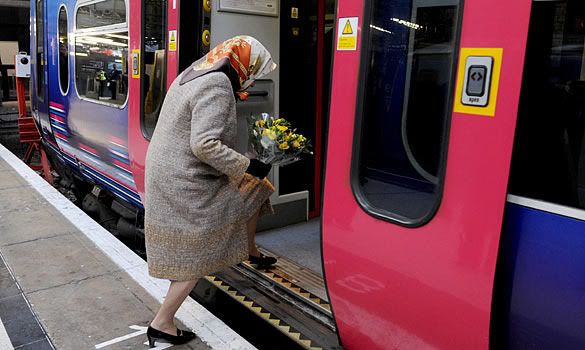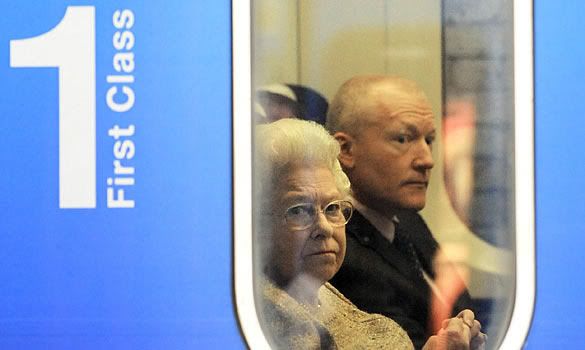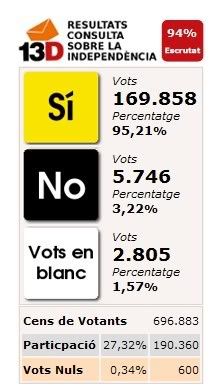Right now, as people who read this blog regularly might be able to tell, I'm excited by what's happening in Catalunya. Not least because I see what Catalunya is doing as trailblazing. If they manage to become independent, taking their own place in the EU and the UN, they will set an example which other countries will be able to follow. I want Wales to be one of them.
But there will be nothing automatic or inevitable about that, so I don't want to raise anyone's hopes (or, if you don't want to see an independent Wales, fears) too much. What is now happening needs to be seen in perspective, but I think we will look back on these events in Catalunya as the most significant step towards independence for stateless nations in developed democracies in Europe.
-
There are a good number of parallels between Spain and the UK. Each is a multinational state, in that their territories comprise a number of distinct nations in which there are substantial (though not necessarily majority) movements for them to cease to be a part of the state. In Spain these are Catalunya, Euskadi (the Basque Country) and to a lesser extent Galicia. In the UK these are Wales, Scotland, to a much lesser extent Cornwall ... and Northern Ireland, which is not a nation and where the corresponding movement is for reunification with the south.
As I see it, the most significant difference between Spain and the UK is that Spain has a constitution but that the UK does not. In saying that, I imagine many reading this will be keen to claim that the UK does have a constitution, but that it's not written down. People are free to believe that, of course, in just the same way as they are free to believe that the Emperor is in fact wearing clothes ... but bear with my line of argument.
-
Spain had to define itself anew after the Franco era, this time as a democracy rather than as a dictatorship. Its primary means of doing that was by its constitution. So in a very real sense "Spain" is what its constitution says it is. In contrast the UK has always thought of itself as a democracy, so the UK has never seen any real need to define itself by means of a constitution. Tradition and precedent are much more important factors in defining what the UK is. This approach does have advantages. It means that as circumstances change, the UK can adapt itself to them while—in line with its emphasis on tradition—claiming that the essential nature of the UK has not really changed.
To illustrate this, look at the way in which what was the British Empire has managed to divest itself of nearly all its territories in the past century. It just calls itself something slightly different, and carries on as if nothing much has happened. What was the United Kingdom of Great Britain and Ireland can slip-in the word "Northern" without having to change the flag. The Empire becomes a Commonwealth, and no-one particularly seems to mind ... as long as enough of those who were its subjects love the Queen and turn up to wave flags when she visits, nothing important can be said to have changed. For some that's been an achievement to take pride in (at least Britain slowly learnt not to fight war after war to hold onto its territories, which is no small thing) though for others the picture is much more like the Black Knight in Monty Python and the Holy Grail.

OK, so much for the illustration. There is a serious point: namely that because the UK is well used to this process, it is unlikely to have any serious problem with it going further. If Ireland is reunified, the UK will just drop the "and Northern Ireland" from its name. If Wales becomes independent, the RUK (remainder of the UK) still won't need to change the flag. And this is not something that affects only what we used to call "the establishment" but now tend to call "the elite" ... it is an attitude that is now widely held by most ordinary people. If a majority of people in Scotland or Wales want to leave the Union, not only will the establishment not stop us (both Labour and Tory Governments have said that they will respect that democratic decision) but the people in the RUK will just shrug their shoulders and say: Good luck, mate. You make your bed, you lie on it. There is a growing number of people who would in fact welcome the move.
There'll obviously be hard negotiations over debts and assets, but there are international rules that can be used if mutual agreement can't be reached. The important thing is that the principle has been conceded. Both we and Scotland can leave the UK whenever a majority of us wants it, and Ireland can be re-unified when a majority in NI wants it. Whatever remains of the UK will just carry on being pretty much what it thinks it always has been. It will obviously involve some upheaval, but the UK has been through far worse in the last hundred years.
-
What I've described is an "end game" situation. But the same attitude prevails in the steps that are taken to get there. The way things have happened so far in the UK is that the Unionists have decided that Wales and Scotland will get whatever degree of devolution they think is necessary to stop the people of Wales and Scotland opting for independence instead ... even though each time the stated intention was to kill nationalism stone dead, or to fix the constitutional situation for a generation.
There are pluses on both sides. For Unionists, the plus is that this approach slows the process down to just one step at a time. For those who want independence, the plus is that a process of getting more autonomy bit by bit develops, thus establishing—in words that will appeal to Unionists—a precedent or even a tradition of ever-evolving devolution. It establishes an expectation that what we don't have now, we will in all probability get in a few more years. It builds up a sense of momentum.
There are some Unionists who show more foresight than their more pragmatic colleagues. They see the problem of momentum all too well and therefore, rather than wanting to fight a continual rearguard action, they think the better approach is to decide what an "ideal" UK should be, and to set that sort of UK up now. The most common vision they have seems to be for a loosely federal UK; one in which each country has a very large degree of autonomy over its own affairs, but yet pools resources for a small number of matters of shared interest.
In other words, by establishing the sort of constitutional arrangement that they expect to exist in twenty or thirty years time anyway, they hope to take out the crucial element of a momentum that can only gather pace. That arrangement then has time to become entrenched, defendable by virtue of the fact that it will have existed unchanged for a generation, and which therefore can (so they will argue) probably exist for several generations more without needing to be changed.
It's a clever idea. But isn't that exactly the situation that Spain is currently in? By many objective standards the degree of autonomy enjoyed by Catalunya, Euskadi and even Galicia is wider than that enjoyed by Scotland ... with Wales even further behind.
-
Whatever we think of Spain's attitude to its nations, it has made a serious attempt to construct itself as a State that allows for a good deal of diversity. It has also managed to show a good degree of consistency of approach by giving other regions of Spain that do not regard themselves as nations—and who have never really shown much desire for autonomy—a similar sort of status as has been given to Catalunya, Euskadi and Galicia. In UK terms, these would be the equivalent of the English regional assemblies. For the UK, the biggest problem with devolution has been its asymmetric nature; in contrast Spain has created a constitutional arrangements that are reasonably coherent and consistent. They're not fixed in stone because the relationship between the autonomous regions and the Spanish State is capable of being revised, and has been revised ... but only within the overarching framework of the Spanish Constitution, since that is what defines what "Spain" is.
-
In the opinion polls shown at the bottom of this page we can see that there is only 20% support for independence for Catalunya when people are offered a multiple choice that includes a "more autonomy" option. In that respect, things are not that different to the way they are in Scotland, or Wales. A majority of us, in each of our countries, wants more autonomy than we currently have.
The crucial difference is that this "next step" option can be made available in Scotland and Wales, because there is no fixed constitutional arrangement to stand in the way of it. But in Spain, there is. Moreover, because Spain's Constitution is such an essential part of its identity as a democracy, this is what Spain "is" in the eyes of its citizens (or at least its Castilian-speaking citizens) as well as its establishment ... and, as I see it, neither its elite nor its population at large will want their Spain to become something else. For them, it will be better that they lose Catalunya and remain a "Spain" that has its own national character, even though it will be a smaller one in terms of territory.
Because of that, I think it is highly likely that Catalunya will become independent some time next year, because any half-way option will be acceptable to neither Castilian Spain nor Catalunya.
-
The best laid schemes o' mice an' men gang alt agley. The ruling "establishment" in Spain thought they had it all under control. They could say: There's no way you can have a referendum because you don't have the power to call one. If you do, we'll decide that's it's illegal and prevent it from happening. After all, it worked to scupper the Ibarretxe referendum in Euskadi this time last year; so playing the same hand should have been enough in Catalunya too.
But a little town found a way round the ruling, not through the political process, but by means of ordinary people who would not be held back. Their action released a tide of pent-up frustration with the political and constitutional chicanery that the Spanish authorities have been using. The lesson must surely be that power ultimately rests with people ... with what they decide they want, not with what the powers that be do or no not "allow" them to do.
-
The Unionist parties in the UK should sit up and take notice of this. In Scotland, for example, a large majority of the Scottish people has been in favour of holding a referendum on independence for some time. The Scottish Government is now trying to deliver one, but the opposition Unionist parties are determined to prevent it from happening at all costs. Yet if you try and hold back the tide of public opinion in one place, there is a very good chance that the tide will break through in another place, in a manner you didn't foresee, and at a speed too quick for you to respond to.
It seems utterly crazy for the Unionist parties—and in particular Labour, since they are in power at Westminster—to be dragging their heels on implementing the Calman recommendations. Yet it's no different from the way they have kept putting off the referendum for a Senedd with primary lawmaking powers in Wales, or of them trying to plant the idea that we will in future need a referendum on something as uncontroversial (in the eyes of most of the legal profession) as transferring administrative responsibility for the justice system to Wales.
By continually making a song and dance of granting us even the most modest set of additional responsibilities for our own internal affairs, they will leave more and more people in Scotland and Wales convinced that independence is the only sensible option left open to them. I'm quite sure that both Labour now, and the Tories when they are in power in Westminster next year, think they can just open the sluice gates a bit more at the last minute to stop pressure building up, but the difficulty they will always face is that although "more powers" is a very easy thing to put into a question in an opinion poll, it is a very hard thing to precisely define. Independence is easy to define. So when the dam holding back the tide of public opinion begins to crack, there will be no time to prepare a comprehensive or coherent "more powers" option. The choice will be between independence and whatever the status quo is at the time ... and the majority will then vote for independence.
What has happened in Catalunya in the last couple of months shows just how quickly the dam can crack.
P.S. I'm going to run a live results service on this blog tomorrow (Sunday) evening for anyone who wants to see how events unfold.










